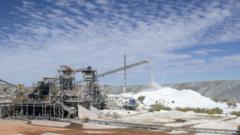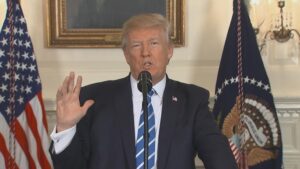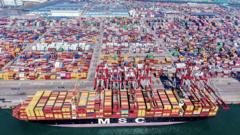With China imposing restrictions on the export of key rare earth elements, Australia seeks to bolster its position and secure its role in the global supply chain for advanced technologies.
Australia Takes Bold Steps as China Halts Rare Earth Exports

Australia Takes Bold Steps as China Halts Rare Earth Exports
Australia's Prime Minister Anthony Albanese promises major investment in critical minerals amid rising tensions with China over rare earth exports.
In a significant political move, Australian Prime Minister Anthony Albanese has committed to investing A$1.2 billion (£580 million) in a strategic reserve for critical minerals if successful in the upcoming election. This initiative follows China's recent export restrictions on seven rare earth elements, recognized as essential for advanced technologies, including electric vehicles and military applications.
While China's controls extend to all nations, they are perceived largely as a retaliatory measure against US tariffs championed by former President Donald Trump. Albanese emphasized the necessity for Australia to prioritize minerals vital for national security, aiming to challenge China's overwhelming presence in the rare earth market.
Rare earth minerals consist of 17 elements crucial to various industries and are labeled "rare" due to the complexities involved in their extraction and refinement. Australia is rich in these resources, including lithium and cobalt, yet China retains dominance over refining, handling approximately 90% of the process globally—an aspect that raises concerns among Western authorities.
China's rationale for imposing these export restrictions stems from the retaliatory strategy against US tariffs, which currently stand at 145%. Analysts highlight that the United States has increasingly recognized its dependence on China for rare earths—about 75% of US imports in this category originated from China between 2019 and 2022. The situation has alarmed US policymakers about national security and technological competitiveness, particularly as comments from industry leaders, including Elon Musk of Tesla, indicate challenges arising from Chinese controls—specifically impacting developments in humanoid robotics.
Albanese's plan envisions not only securing Australia’s mineral reserves but making them accessible to both domestic industries and international allies, such as the US and EU. However, experts remain sceptical about its efficacy. Philip Kirchlechner, director of Iron Ore Research in Perth, acknowledges the significance of the investment but insists that without improvements in refining capabilities, Australia's initiative may not sufficiently address the existing dominance exercised by China.
While Australia currently extracts a major share of global lithium, its ability to refine it remains limited—less than China’s extensive operations despite Australia's larger mining output. As efforts accelerate to develop in-country refining capabilities—like Arafura Rare Earths' combined mine and refinery in Perth and the opening of the first processing plant in Western Australia—predictions suggest reliance on China for refining will continue at least until 2026.
In the context of these developments, China's position appears resilient as it has been leveraging the situation to promote a narrative favoring cooperation over confrontational trade policies. Assistant analysts warn that despite Australia’s strategic moves, vulnerabilities in refining will persist, allowing China to maintain leverage over global prices and supply chains.
Albanese's approach has been characterized as more nuanced and could empower Australia to sell its resources strategically during times of economic tension, offering alternatives to global markets impacted by Chinese export controls. However, without a breakthrough in refining capabilities, Australia may continue to grapple with the implications of China's near-monopoly over rare earth processing.
While China's controls extend to all nations, they are perceived largely as a retaliatory measure against US tariffs championed by former President Donald Trump. Albanese emphasized the necessity for Australia to prioritize minerals vital for national security, aiming to challenge China's overwhelming presence in the rare earth market.
Rare earth minerals consist of 17 elements crucial to various industries and are labeled "rare" due to the complexities involved in their extraction and refinement. Australia is rich in these resources, including lithium and cobalt, yet China retains dominance over refining, handling approximately 90% of the process globally—an aspect that raises concerns among Western authorities.
China's rationale for imposing these export restrictions stems from the retaliatory strategy against US tariffs, which currently stand at 145%. Analysts highlight that the United States has increasingly recognized its dependence on China for rare earths—about 75% of US imports in this category originated from China between 2019 and 2022. The situation has alarmed US policymakers about national security and technological competitiveness, particularly as comments from industry leaders, including Elon Musk of Tesla, indicate challenges arising from Chinese controls—specifically impacting developments in humanoid robotics.
Albanese's plan envisions not only securing Australia’s mineral reserves but making them accessible to both domestic industries and international allies, such as the US and EU. However, experts remain sceptical about its efficacy. Philip Kirchlechner, director of Iron Ore Research in Perth, acknowledges the significance of the investment but insists that without improvements in refining capabilities, Australia's initiative may not sufficiently address the existing dominance exercised by China.
While Australia currently extracts a major share of global lithium, its ability to refine it remains limited—less than China’s extensive operations despite Australia's larger mining output. As efforts accelerate to develop in-country refining capabilities—like Arafura Rare Earths' combined mine and refinery in Perth and the opening of the first processing plant in Western Australia—predictions suggest reliance on China for refining will continue at least until 2026.
In the context of these developments, China's position appears resilient as it has been leveraging the situation to promote a narrative favoring cooperation over confrontational trade policies. Assistant analysts warn that despite Australia’s strategic moves, vulnerabilities in refining will persist, allowing China to maintain leverage over global prices and supply chains.
Albanese's approach has been characterized as more nuanced and could empower Australia to sell its resources strategically during times of economic tension, offering alternatives to global markets impacted by Chinese export controls. However, without a breakthrough in refining capabilities, Australia may continue to grapple with the implications of China's near-monopoly over rare earth processing.


















